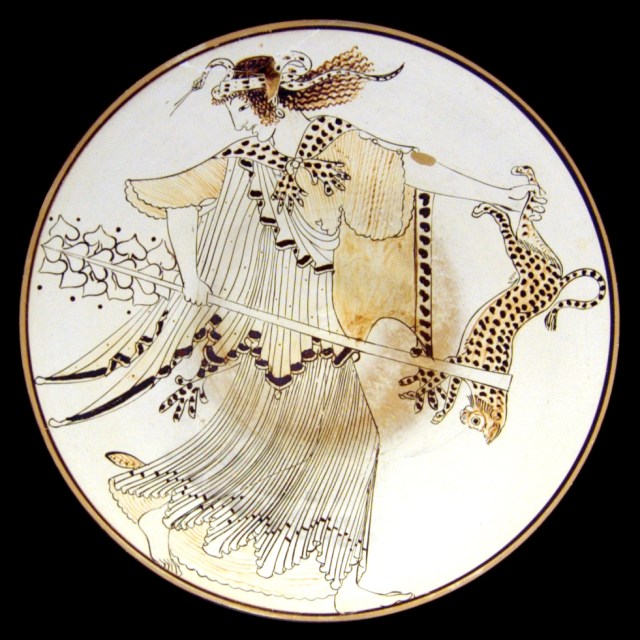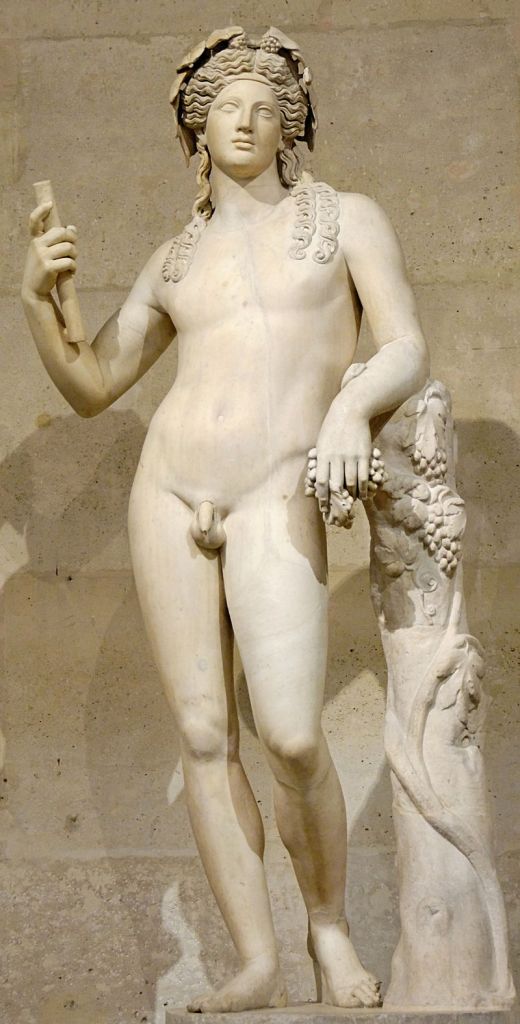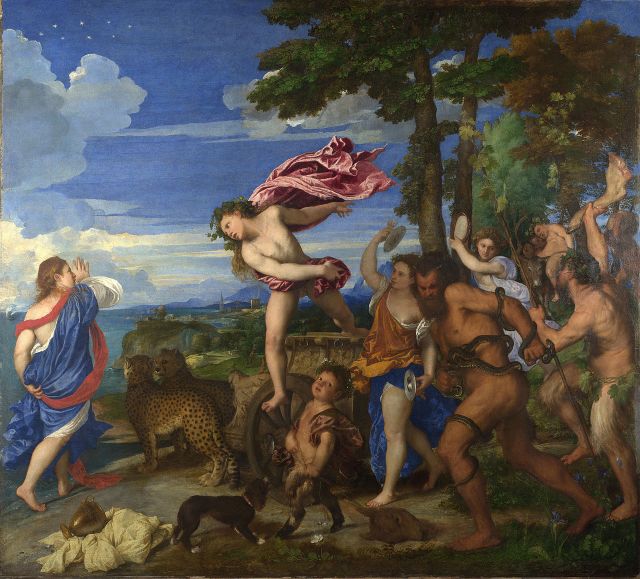If you want a god of sex, wine and smashing the gender binary into little tiny pieces you might want to try Dionysus. God of the stranger, the Other and religious ecstasy, Dionysus travels the countryside with his* consort Ariadne, followed by a continuous rolling orgy of nymphs, satires and mortal women. Called Maenads, these women gave up their families and positions in order to follow him, surrendering themselves fully to that animal state the ancient Greeks believed all women possessed. Armed with thyrsi, giant fennel staves, these women were drunk, sexually aggressive and, when sufficiently roused, liable to rip apart and eat anything that crossed their paths, from lions to their own sons. Failure to offer him worship and appropriate respect would bring him to your town, at best to lure the women away as Maenads, at worst to turn them loose on the men.
“Seizing his left arm at the elbow and propping her foot against the unfortunate man’s side, she tore out his shoulder, not by her own strength, but the god gave facility to her hands. Ino began to work on the other side, [1130] tearing his flesh, while Autonoe and the whole crowd of the Bacchae pressed on. All were making noise together, he groaning as much as he had life left in him, while they shouted in victory. One of them bore his arm, another a foot, boot and all. His ribs were stripped bare [1135] from their tearings. The whole band, hands bloodied, were playing a game of catch with Pentheus’ flesh.” Euripides Bacchae

A maenad
Dionysus is a late addition to the pantheon and the myths reflect this. Neither the Greeks nor modern scholars can agree on where he and his cult came from, though the most popular version has him migrating to Greece from central Asia. The bastard son of Zeus and, depending on the source, a selection of women ranging from the mortal princess Semele to Persephone, Queen of the Underworld, all of his origin stories share one feature; that either he or his pregnant mother were killed only for him to regenerate or finish gestating inside the body of a second parent. In all versions of the myth it is Hera, Zeus’ ever-jealous wife, who is responsible for the murder and so Zeus sends him away to Asia or Africa to be raised safely in secret.
This second birth and regeneration made him important in the mystery cults, secretive religions focusing on life after death (Christianity was originally viewed as one and they formed its primary competition until the Christianised Roman Empire eventually banned them). The worship practices of those cults relied on religious ecstasy, the entering of an altered state of consciousness through spiritual transcendence, and generally offered women and other low-status people higher status than the world outside. Dionysus of the cults is usually Dionysus of the underworld, the son of Zeus and his daughter Persephone, or her mother Demeter, goddess of the earth. Known as Zagreus, his death comes in infancy where he is literally dismembered by Hera’s servants, only to regenerate by means of his heart being implanted either in Zeus’ thigh or Princess Semele’s womb. Dionysus here offers his disenfranchised followers — women, the poor and the social outcast — a relief from their misery through pleasure, and the promise of a better afterlife than the uninitiated regardless of social status.

His second birth also ties into his unusual gender identity, not in the historic cult but rather in modern worship and modern gender narratives. Transness is often publicly subjected to narratives of death and rebirth, even while individual trans people frequently reject that characterization of transition Dionysus the twice-born is also the only Greek deity to possess a gender identity that doesn’t align with the one coercively assigned to his body. While Greek myths not infrequently feature physical transformations from one gendered body type to another, and even an intersex god named Hermaphroditus, those figures identified as whatever gender society assigned to the body they were inhabiting at the time. Dionysus on the other hand was first assigned male, then lived as a girl until reaching adulthood, only to reject both binaries and embrace a bigender identity that caused great anxiety to the category loving Greeks. It is possible that his gender identity has a non-Greek cultural origin, if the theory that his cult was originally Middle Eastern is correct, because many cultures in the ancient Middle East recognised transfeminine identities and often connected them to spirituality. However, for the Greeks — who had no concept of transness or nonbinaryness as a social identity, but were very aware that some men were not “real” or “complete” men because of elements of femininity in their soul — Dionysus’ open embrace of his femininity was actively transgressive and horrifying.

© Marie-Lan Nguyen / Wikimedia Commons, CC BY 2.5
His femininity, attached to a body defined as male, is a large part of what made him threatening. Despite ancient Greek women needing to live lives of exemplary sexual self control if they wanted to survive while ancient Greek men happily engaged in orgies and wrote about rape as if it were a casual sport, sexual self control was considered a purely masculine virtue. Intense desire and the inability to control it were the afflictions of women, or particularly effeminate men. The fact that he sought out women and offered them wine, something their access to was heavily restricted due to the belief that it would make them lose what self control they had, made Dionysus a threat to the fundamental building block of the city state — that a man have legitimate children to replace him. We can still see this fear today in the cis male anxiety around queer and female sexuality, so afraid of losing their sexual dominion over women that they attempt to control it through legislation and violence.

Dionysus, despite his apparently uncontrollable sexuality and many lovers, is one of the few Greek gods to love and respect his wife, something that is probably also meant to emphasise his departure from “proper” masculinity. He found Ariadne, a mortal princess, abandoned by the hero Theseus after she had forsworn her family and her people in order to marry him. Unlike most of the gods in the pantheon, who would have responded to seeing a lone, pretty mortal by raping her, Dionysus rescues her, woos her and makes her his consort. He never abandons, insults or forsakes her and, while he does take other lovers, she seems totally fine with this, clearly being down with her non binary spouse’s casual poly lifestyle.
Viciously defending his own honour and the safety of his followers, Dionysus is a god for the queer, the feminist and particularly those whose gender falls outside of the cisgender binary. As the divine pioneer of weaponising a party to defend your rights, the upcoming Pride season seems like a particularly appropriate time to call on him, so pour him a drink and invite him in.
*though I argue that Dionysus has a non binary transfeminine identity I am using male pronouns because those are the ones the sources texts used for various cultural reasons.



Dionysus, sounds like a LGTB bar in midtown Manhattan.
There is a gay bar in Honolulu named Bacchus, the Latin name for Dionysus!
Thank you for the link to the mystery cults! Currently studying a history of the Roman World module at uni and it will come in handy for revision material!!
Your generalisation of cis men is disgusting, acting as if all of them use sexual violence against women.
You are no better than the people you clearly claim to dislike.
Demonizing all cis men as rapists is the reason why activists like you are despised.
This is such a great article. Dionysus has always been my personal favorite of the Greek gods but whenever I tell people they’re always like “isn’t he just the god of wine?” He’s such a fascinating figure with a lot of modern sensibilities.
Yes would you like to study some of the rituals and find your true expression of self that you are scared of but k ow exists ? I’ll show u what ur mind can do
This is a really interesting take on Dionysus. I was somehow unaware that “he” was the rescuer of Ariadne. On the whole I have been guilty of being a little dismissive of Dionysus. I have never been his biggest fan, the parties sound a bit too rowdy for my tastes. But having read your article I suppose if he moved next door, maybe I would invite him round for coffee, or maybe wine and cakes. :)
I read somewhere, or was told by a professor, that the immortal who would become the Greek Dionysus was likely a goddess in the place where their worship originated. I can’t actually remember where I read that, but I like the idea, especially in the context of this article–it makes Dionysus all KINDS of trans.
Dionysus seat on olympus originally belonged to Hestia the goddess of the hearth who was sister of Zeus, Poseidon and Hades, when dionysus ascended to olympus she gave her seat to him.
I’m so putting “clearly down with her non binary spouse’s casual poly lifestyle” on my okc profile.
We’re loving these :) I’ll have to tell my muse the story of dionysus :) obviously I’m obsessed w Greece but I told her the last one & even though she’s not a geek like me, she does too. It’s so fun hearing someone who’s not geeky like me talk about it. She says ‘Zeus was kind of a dick’… (true but I never thought to phrase it like that, I love her cos she doesn’t phrase stuff in a pompous way).
Thanks for this as well cos I need European (ish, as European as Christianity) models of being nb to tell me that I’m not being appropriating when it comes to labelling myself nb. As much as it’s a good fit. Ideally I’d like Irish/French (Gallic) ones but that’s me being selfish & thinking ‘was any of my ancestors like me’
There’s a community of queer people in polytheism who work in a lot of pre-Christian European and Mediterranean spaces, and outside of academia, they’re gonna be your best bet for finding stories. PSVL comes to mind (psufenasviriuslupus.wordpress.com). Outside of strictly talking about queerness, one of the bloggers on polytheist.com was looking at polytheism in the cultures that eventually became the French. You can likely find some good sources to look at what remains of the mythology, but your mileage may vary given that literacy wasn’t as high as it was in Greece and Rome, so many of the texts one is relying on come from Roman writers.
OK, I need more coffee at 7:30 AM than I thought. This was supposed to be a reply to Liam.
Don’t worry it arrived as a reply to me :) Thanks, I’ll look into that :)
I wouldn’t go as far as saying He’s non-cis, but He and His male followers were crossdressers, and I’m glad crossdressers have representation. Growing up, He had to disguise Himself as a girl, and simply chose to retain feminine characteristics thereafter. Also, I haven’t read anything about Him joining in on orgies (just throwing parties where His followers had orgies sometimes), but if He did, then I’m sure His wife (co-party-thrower) would join in, not just be cool with it. Interesting read though.
(I’m capitalizing the male pronouns, not to emphasize them/my point, but because I’m a Wiccan and we capitalize pronouns for the gods.)
Sorry to be a Debbie Downer, but I feel you have been *very* selective in your sources to tell one particular narrative.
In what version do Ariadne and Dionysus live in marital bliss? Where does it say she was happy for him? Her story is the typical transformation/escape type (as commonly found in Ovid) whereby she undergoes such a terrible loss (i.e. of Theseus) that a god’s intervention is her only way out of misery. Ultimately she becomes a constellation (e.g. in Apollonius Rhodius)
In the Odyssey, she is killed by Artemis before she even married Dionysus. In pseudo-Apollonius, he kidnaps and rapes her. In Diondorus Siculus, they just disappear. Pausanias wonders whether Dionysus finds her or actually captures her. In Nonnus, she is a consolation prize after losing a contest for a different woman to Poseidon. Only in Ovid (who famously loved to subvert traditions) is Ariadne given any voice at all. All the other stories are further at the creepy/rapey end of the spectrum. And that doesn’t sound to good for our judgement of Dionysus, does it? He seems to be as aggressive as all the other Greco-Roman gods.
I agree that he is described in somewhat softer terms by Greeks and Romans than your typical warrior-man, but as far as I see gender-roles in those societies, it was more about activity/passivity during intercourse that defined your status. Dionysus is youthful (i.e. could have been regarded as an Athenian eromenos) but there is little evidence (only Pseudo-Apollonius) that says he was brought up a girl. Ovid describes him a girly-looking, not a girl. And in myths he has 2 dozen children by various women, suggesting to an ancient audience that he is at the virile/manly end of the gender world. In his main festival in Athens, the principal part was a parade of dicks (phalloi) through the city. It doesn’t get much more male than that!
Oh thank goodness. There’s at least one who thought what I was thinking.
Not to be that person, the Dionysus you’re talking about seems to be the one of your own fantasy, not Greek mythology. Dionysus’ “parties” never happened without wild sex, so they were rather orgies than parties. If anyone threw parties, it was Apollo and the Muses.
Anyone who has read Dionysus’ myths knows that he’s no feminist. “Unlike most of the gods in the pantheon, who would have responded to seeing a lone, pretty mortal by raping her” he does rape not one but two women in the same way. He has also made fathers rape their daughters so…
Moreover, even though he did give women temporary freedom, he also inflicted madness upon those who didn’t want it. That’s just kinda an oppression in the name of freedom. He didn’t respect their needs, he just wanted followers and was down to do anything for that.
And though they make a cute couple, and do love each other, many traditions state that Dionysus threatened Theseus to leave Ariadne so that he would seem like a hero to her lol :P not very feminist if you ask me. I’d rather prefer Apollo, who even though not completely clean, has helped his lovers more than any other god, especially through their pregnancies, sometimes even taking the responsibility of the child all on himself, giving them immortality (if he felt like it) He even saved the granddaughters of Dionysus and made them goddesses. His Pythia was the most respected and powerful woman in ancient Greece. He’s a lot better than Dionysus in treating women. (Not that he respected them always lol. None of the Greek gods did)
You present it as if Dionysus was the only god was effeminate and didn’t adhere to the traditional masculinity. You have Eros, Hymenaios and Apollo himself too, whose effeminacy was mocked by Niobe and Romulus. (Apollo and Artemis were known for subverting gender roles, her being manly and him being feminine) Apollo was also openly pansexual that it would put Dionysus to shame.
Honestly, taking any Greek god or goddess too, would sound really wrong because they all never respected the mortals, men or women. They were beings who did what they wanted.
I agree with the two comments pointing out that you are being very selective and misleading in your portrait of Dionysus. What is your source for claiming that he changed gender? There is no such source as far as I know. Your description of the Maenads is a ridiculous generalization. Etc., etc. There is no single account of any Greek myth. Any account that makes blanket statements about a god or myth without adding “According to Homer” or “According to Catullus” is not to be trusted.
In fact, the OP seems to be confusing hiding by dressing as a girl with being assigned female gender at birth. After Dionysus was born (male), he was given to a mortal couple to bring him up as a girl to protect him from Hera’s jealous vengeance. Nothing suggests that he was “born female,” to use the conventional term, or yearned to be something else, and he shed this disguise when Hera drove his foster parents mad and he had to be rescued by Hermes–who turned him into a goat as his next disguise, by the way. If you are looking for positive models of gender fluidity in ancient mythology, there are better examples that you can find without distorting and misrepresenting these myths.
And, as a previous poster pointed out, the story of the god’s being hidden from Hera by being dressed as a girl is only found in Pseudo-Apollodorus’s late handbook of myth, and not in any literary text.